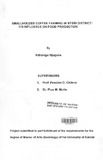| dc.contributor.author | Ndirangu, Njuguna | |
| dc.date.accessioned | 2013-05-09T12:00:19Z | |
| dc.date.issued | 2009 | |
| dc.identifier.citation | Master of Arts | en |
| dc.identifier.uri | http://erepository.uonbi.ac.ke:8080/xmlui/handle/123456789/20833 | |
| dc.description.abstract | It was hypothesized that cultivation of cash crops by smallholder farmers was
likely to alter their food sufficiency positions from their farm production. The
study centered on the theme of allocation of farm-level factors of production
and how farmers strived to counter-balance them in pursuit of both market
and subsistence production. The study also examined how agricultural
policies tended to favour cash crop production.
The study reflects the outcome of contradictions between traditional
subsistence and modern market-oriented ideas about farming, superimposed
on a social and economic structure that is ill equipped to take new
developments. The imbalances emanating from the attempts to straddle
between market and subsistence production reflect intricacies generated by
everyday simple happenings in small holders' agriculture. They succumb to
the pressure especially on land and labour, two very crucial facets of their
economy. The minimal concentration on subsistence production affects the
life of the farmer as a whole. The quantities of food production suffer at the
hands of the market economy. Food deficiencies and unequal exchange
eventually become prominent features of the« agriculture.
The study's theoretical orientation focuses on the question of capitalist
expansion and its effects on peasant modes of production. The trend of
development through processes of market production has wrought adverse
effects on peasant's subsistence production. Since their search for livelihoods
in the changed situation must necessarily be within the context of exchange
economy, it becomes essential to focus on how their agriculture is
constrained by the ecology, hence utilization of the theory of intensification.
Several recommendations are submitted as remedial measure in so far as
correcting the imbalances registered in the production processes a
re concerned. The recommendations underlie the need to approach rural
development planning with a fuller knowledge of the potentials and internal
dynamics of smallholder agriculture. | en |
| dc.description.sponsorship | University of Nairobi | en |
| dc.language.iso | en | en |
| dc.publisher | University of Nairobi | en |
| dc.subject | Coffee farming | en |
| dc.subject | Kenya | en |
| dc.title | Smallholder Coffee Farming In Nyeri District: Its Influence On Food Production | en |
| dc.type | Thesis | en |
| local.publisher | Faculty of Arts, University of Nairobi,Kenya | en |

